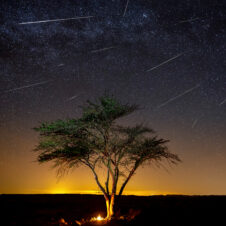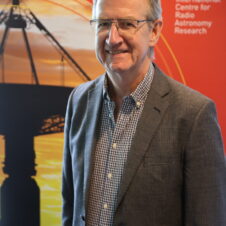The Ken and Julie Michael Prizes recognise the outstanding achievements of our graduate students at both ICRAR nodes.
The 2021 award recipients are joint winners James Buchan & Stefan Duchesne from ICRAR-Curtin and Ruby Wright from ICRAR-UWA.

Dr Ken Michael, Prof Melanie Johnston-Hollitt, Stefan Duchesne, & A/Prof Randall Wayth
Stefan’s doctoral research has advanced not only our knowledge of galaxy clusters on mega-parsec scales but has also established a processing pipeline (called flux_warp) which is currently being used by a number of other researchers. His contributions to data processing have far-reaching impact across a number of low-frequency science areas. He has written six first-author papers during his PhD and co-authored a further eight, establishing strong links with a number of science groups. Both his first-authored and co-authored papers are being regularly cited, with over 150 citations on ADS already.

Dr Ken Michael, James Buchan, Dr Adrian Sutinjo
James’s PhD work, done part-time in conjunction with an industry partner, has produced a prototype power converter for powering SKA-Low stations. Such converters use electronic switching to generate desired DC currents and voltages. However, the switching process also generates undesirable electromagnetic interference (EMI) at SKA-Low frequencies. His prototype design uses novel component topologies to shape the switching transition in such a way that this EMI is minimised. The technical results in his thesis are viewed as of such commercial importance that the release of the thesis has been embargoed for a period.

Dr Ken Michael, Ruby Wright, Dr Claudia Lagos
Ruby’s research has been focused on understanding the baryon cycle of galaxies. By analysing results from EAGLE, one of the largest cosmological hydrodynamical simulations of the Universe, she has measured quenching timescales, quantified baryonic and dark matter inflow rates, characterised the properties of gas accretion onto haloes, and is currently investigating gas flows in galaxy groups. Thus far, Ruby has three first-author peer-reviewed papers, with a fourth soon to be submitted. Her work is highly regarded and impactful, made evident through the number of citations by other researcher who are applying Ruby’s results to their own studies.
Ruby is a Perth local, and is looking forward to pursuing job opportunities overseas after graduating. Outside of astronomy, she is also an avid sportswoman – having represented Australia several times playing floorball (a variant of indoor hockey).
Congratulations to the winners and their supervisors, and to all the applicants for their achievements. Thanks to Dr Ken Michael for his generous support for this Prize, first awarded in 2017 to Chenoa Tremblay & Tristan Reynolds, in 2018 to Ahmed Elagali & Sam McSweeney, in 2019 to Mengyao Xue & Fei Qin and in 2020 to Dr Pikky Atri, Dr Kate Harborne & Benjamin Dix-Matthews.

